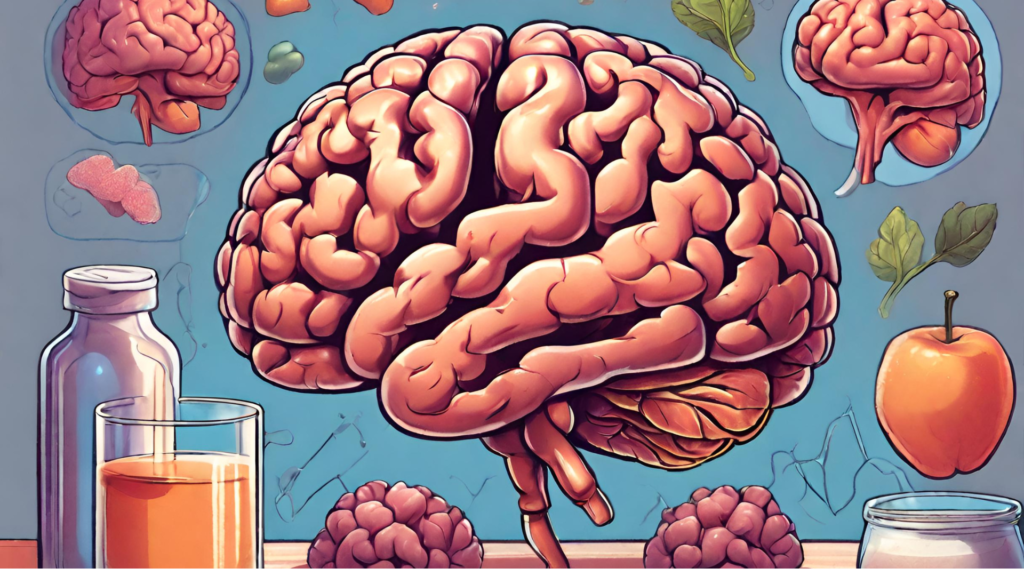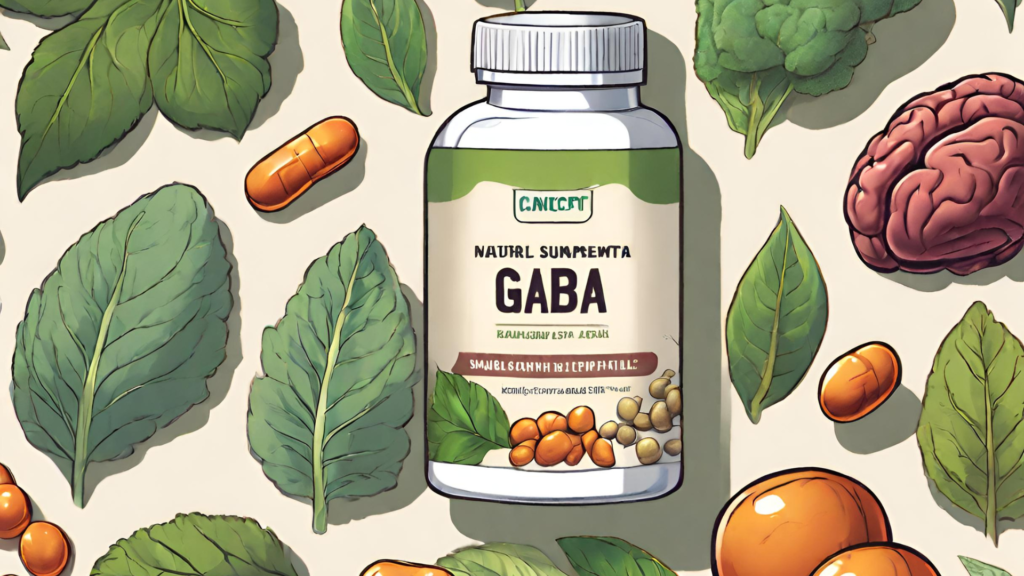How To Increase GABA: 5 Effective Ways to Increase GABA for Mental Health and Anxiety Relief

How to Increase GABA Levels for Mental Health and Anxiety Relief
Mental Health and well-being are at an all-time low in the USA.
Stress and anxiety are becoming more and more commonplace in our world. Fear is also pushed on us daily from all media platforms.
In this article, I want to share how to increase GABA so you can calm the fight-or-flight mechanism, which often runs on autopilot.
It may also help you get better quality sleep and remain focused and stable throughout your day.
Of course, there are many pieces to creating a sense of calm and well-being, which we will discuss in more detail later.
Today, we are talking about how to increase GABA.
GABA is a critical neurotransmitter that allows us to send and receive chemical messages.
GABA helps to calm this pathway down.
It can also quench hyper nerve cell activity, such as in ADHD.
It may be a key player in helping those with depression.
Low GABA levels contribute to fear states.
There’s a natural way to help alleviate these symptoms and improve your mental well-being.
It begins with adequate amounts of GABA the neurotransmitter (gamma-aminobutyric acid), in the brain playing a pivotal role in regulating mood and anxiety levels.
Low levels of GABA have also been associated with mental health disorders such as anxiety, depression, and insomnia.
However, by increasing GABA levels naturally, you can take a proactive approach to improving your mental health and finding relief from anxiety symptoms.
In this article, I will explore how to increase GABA levels with and without supplements.
We’ll discuss the importance of diet, consciousness, exercise’s impact, and the benefits of mindfulness practices.
Specifically, I like to do hemi sync-type meditations, which help to balance the entire brain.
Hemisphere syncing will help us to be able to see from a more complete perspective.
Instead of focusing on acute situations we can include the right part of the brain to see with an expansive view.
We are powerful beings and must also exercise our profound power to heal ourselves.
I also practice being the witness of this construct in our minds we call 3D reality.
Due to our dense resonance, we only see a tiny fraction of what is really here.
The more we expand our awareness, the more we can see more than meets the physical eye.
Additionally, we’ll explore the relationship between GABA and sleep, understand how GABA improves sleep quality, and provide tips for better sleep.
We’ll also examine the role of diet and nutrition in increasing GABA levels, including specific foods that can naturally boost your GABA production.
But what about GABA supplements?
We’ll examine the science behind them, their potential benefits, and the risks involved.
And if supplements aren’t for you, don’t worry—I’ll provide natural alternatives that can help increase your GABA levels.
Finally, I’ll share techniques for integrating physical activity, relaxation practices, and lifestyle changes into your daily routine to promote optimal GABA levels for long-term mental health.
With an approach of directing the mind, utilizing nutrition, top-quality supplements when needed, exercise, and self-care techniques, our mental health can soar to new heights.
To me, this includes spending time in nature and getting out of the boxes in which we typically spend most of our time.
Natural light, the forest, and connection to others can do wonders for mental health.
Key Takeaways:
- Low GABA levels are associated with the autopilot fight or flight response, fear, anxiety, depression, and insomnia.
- Boosting GABA naturally can improve mental well-being and alleviate anxiety symptoms.
- Diet, exercise, and mindfulness practices can increase GABA levels without supplements.
- GABA plays a crucial role in promoting sleep quality, and increasing GABA can enhance sleep.
- Foods rich in nutrients, such as bananas and nuts, can naturally boost GABA production.
Something important to mention is if you are dealing with a chronic infection or are under major stress it becomes challenging for your body to produce GABA.
So be sure to look into any underlying infections or causes of chronic stress.
Then you can utilize a healthy magnesium rich and B vitamin rich diet with living enzymes to help the conversion. Without certain enzymes the conversion can not occur.
This is why I love to incorporate a large organic salad with nutritional yeast and sprouted seeds as a potential solution to help conversion.
What is GABA and Why is it Important for Anxiety and Mood?
GABA, or gamma-aminobutyric acid, is an inhibitory neurotransmitter that plays a critical role in the brain.
It acts as a calming signal, reducing neural activity and promoting a sense of calmness and relaxation.
GABA helps regulate anxiety and mood by inhibiting the transmission of excitatory signals, such as glutamate.
GABA as an Inhibitory Neurotransmitter
GABA acts as a natural “brake” in the brain, preventing overactivity and maintaining a balance between excitation and inhibition.
Its inhibitory properties help reduce anxiety and promote a state of calmness.
By increasing GABA levels, individuals can enhance GABA’s calming effects and support their mental well-being.
Role of GABA Levels in the Brain
Optimal GABA levels are crucial for the proper functioning of the brain.
GABA receptors are widely distributed throughout the central nervous system, including the amygdala, hippocampus, and prefrontal cortex, areas associated with emotions and cognitive processing.
Normal GABA levels help regulate these brain regions, promoting emotional stability and mental clarity.
Effects of Low GABA Levels on Mental Health
Low levels of GABA in the brain have been linked to an increased vulnerability to mental health disorders, including anxiety, depression, and insomnia.
When GABA levels are insufficient, neural activity becomes imbalanced, leading to heightened anxiety, mood disturbances, and difficulty coping with stress.
By addressing low GABA levels, individuals can alleviate symptoms and improve their mental health.
| Effect of Low GABA Levels | Mental Health Symptoms |
|---|---|
| Anxiety | Excessive worry, restlessness, panic attacks |
| Depression | Low mood, loss of interest, feelings of hopelessness |
| Insomnia | Difficulty falling asleep, restless sleep, frequent awakenings |
Top Natural Ways to Boost GABA Levels Without Supplements
Boosting GABA levels naturally can have significant benefits for mental health and anxiety relief.
There are several effective and natural ways to increase GABA without the use of supplements.
Incorporating these methods into your daily routine can help promote optimal GABA levels and enhance overall well-being.
Importance of Diet in Increasing GABA Naturally
Diet plays a crucial role in GABA production and can greatly impact its levels in the brain.
Certain foods contain nutrients that support GABA synthesis and help maintain healthy levels of this important neurotransmitter.
Consider including the following GABA-boosting foods in your diet:
- Bananas: Rich in vitamin B6, essential for GABA production or as a low glycemic option try Non Fortified Nutritional Yeast.
- Soaked Sprouted Nuts and seeds: High in magnesium, which promotes GABA synthesis.
- Whole foods: Such as spinach, red cabbage and eggs contain glutamine, a precursor for GABA production.
Exercise and Its Impact on GABA Production
Regular exercise has been shown to stimulate GABA production and release in the brain.
Engaging in physical activity can help increase GABA levels and enhance mental well-being.
Aim for at least 30 minutes of moderate-intensity exercise, such as brisk walking or cycling, on most days of the week to reap the GABA-boosting benefits.
Mindfulness Practices to Stimulate GABA
Mindfulness practices, such as meditation and yoga, have been linked to increased GABA levels and reduced anxiety.
These practices promote relaxation and help calm the mind, fostering an environment conducive to optimal GABA production.
Consider incorporating mindfulness techniques into your daily routine to support GABA synthesis and enhance mental well-being.
| Natural Ways to Boost GABA Levels Without Supplements | Benefits |
|---|---|
| Including GABA-boosting foods in your diet | – Supports GABA synthesis – Improves mental well-being – Reduces anxiety |
| Engaging in regular exercise | – Stimulates GABA production – Enhances mood and mental health – Alleviates anxiety symptoms |
| Practicing mindfulness techniques like hemi sync | – Increases GABA levels – Promotes relaxation – Reduces anxiety and stress |
Understanding the Relationship Between GABA and Sleep
GABA, also known as gamma-aminobutyric acid, plays a crucial role in promoting sleep quality and regulating sleep patterns.
By understanding the relationship between GABA and sleep, we can explore natural ways to enhance our sleep and overall well-being.
How GABA Improves Sleep Quality
GABA acts as an inhibitory neurotransmitter in the brain, helping to calm neural activity and promote relaxation.
This calming effect facilitates the transition into a deep, restorative sleep.
By increasing GABA levels, we can improve the quality of our sleep, allowing us to wake up feeling refreshed and rejuvenated.
Natural Ways to Increase GABA for Better Sleep
There are several natural ways to increase GABA levels and promote better sleep:
- Relaxation techniques: Engaging in relaxation practices such as deep breathing exercises, progressive muscle relaxation, and meditation can stimulate GABA production and promote a more peaceful sleep.
- Regular physical activity: Exercise has been shown to increase GABA production and release in the brain, leading to improved sleep quality. Aim for at least 30 minutes of moderate-intensity exercise daily.
- Avoid caffeine and alcohol: Both caffeine and alcohol can interfere with sleep and negatively impact GABA levels.
Limit your consumption of these substances, especially in the hours leading up to bedtime.
- Establish a bedtime routine: Creating a consistent bedtime routine signals your body that it is time to wind down and prepare for sleep.
This routine can include activities such as reading, taking a warm bath, or practicing relaxation exercises. Be sure your environment is pitch black or wear an eye mask.
The Effect of Low GABA Levels on Sleep Patterns
Low GABA levels have been associated with sleep disorders, such as insomnia.
Insufficient GABA levels can lead to difficulty falling asleep, frequent awakenings throughout the night, and poor sleep quality.
By addressing low GABA levels through natural methods, we can alleviate these sleep disturbances and promote a more restful night’s sleep.
| GABA and Sleep | Impact |
|---|---|
| Increased GABA levels | Better sleep quality and enhanced sleep duration. |
| Low GABA levels | Sleep disturbances, difficulty falling asleep, and frequent awakenings. |
| Natural ways to increase GABA | Improved sleep patterns and reduced sleep disorders. |
How to Use Diet and Nutrition to Naturally Increase GABA Levels
Optimizing GABA levels in the brain can be achieved through diet and nutrition.
By incorporating specific foods and making mindful choices, individuals can naturally enhance GABA production and promote mental well-being.
Here are some strategies to consider:
Foods that Boost GABA Levels
Certain foods are rich in nutrients that support the synthesis and release of GABA in the brain.
Including these foods in your diet can aid in increasing GABA levels. Some examples include:
- Bananas
- Soaked and sprouted Nuts (such as almonds and walnuts)
- Nutritional yeast and Wheat Germ
- Soaked Lentils and beans
- Spinach and other leafy greens
These foods provide essential vitamins and minerals that play a role in GABA production, helping to promote feelings of calmness and relaxation.
The Role of Fermented Foods in GABA Production
Fermented foods are another excellent addition to your diet when aiming to increase GABA levels.
These foods undergo fermentation by beneficial bacteria, which enhances GABA production. Consider adding the following fermented foods to your meals:
- Yogurt
- Kefir
- Sauerkraut
- Kimchi
These foods not only provide a natural source of GABA but also offer probiotics that support gut health, which can positively impact mental well-being.
Supplements vs. Natural Food Sources to Increase GABA
While GABA supplements are available, many individuals prefer to obtain GABA through natural food sources.
Natural food sources offer additional nutritional benefits, making them a preferred choice for increasing GABA levels.
Supplements can be useful when food sources are limited or as a temporary measure, but they should not replace a nutrient dense whole food diet.
It’s essential to consult with a healthcare professional or nutritionist before considering GABA supplements to ensure they are appropriate for your specific needs and circumstances.
By incorporating these diet and nutrition strategies, individuals can naturally increase GABA levels and support their overall mental well-being.
Remember to prioritize a balanced diet and make mindful choices to optimize GABA production.
The Science Behind GABA Supplements: Pros, Cons, and Alternatives
GABA supplements are a popular option for individuals looking to increase GABA levels in the brain.
Understanding how these supplements work is essential for making informed decisions about their use.
Here, we explore the science behind GABA supplements, their benefits, potential risks, and natural alternatives.
Understanding how GABA supplements work
GABA supplements contain synthetic forms of the neurotransmitter GABA, which can be easily absorbed by the body.
Once ingested, these supplements increase GABA levels in the brain, providing calming effects and promoting relaxation.
By raising GABA levels, these supplements aim to alleviate anxiety and enhance mental well-being.
Benefits and potential risks of taking GABA supplements
GABA supplements offer several potential benefits. They are commonly used for stress relief, promoting relaxation, and improving sleep quality.
Additionally, they may help reduce symptoms of anxiety and support mental clarity and focus.
However, it’s important to note that GABA supplements have some potential risks and limitations.
Due to the blood-brain barrier, it is debated whether ingested GABA can effectively cross into the brain.
Moreover, the effectiveness of GABA supplements may vary among individuals, and their long-term effects and safety have yet to be extensively studied.
If the gut is unhealthy, it will be even more challenging to absorb it. This is why Liposomal GABA is the one I choose to supplement with so that I get some passing the Blood Brain Barrier.
I think another route you could take is a whole food B vitamin suppository with magnesium.
This would help get the precursors into the system without going through the gut.
Natural alternatives to GABA supplements
For individuals who prefer natural alternatives, there are several methods to naturally increase GABA levels without relying on supplements.
These include:
- Incorporating GABA-boosting foods into the diet, such as bananas, sprouted nuts, nutritional yeast and even mushrooms like Chaga can help
- Practicing stress management techniques, such as meditation, deep breathing exercises to help open up blood vessels
- Engaging in regular physical activity, which has been shown to stimulate GABA production
- Exploring herbal remedies with GABA-like properties, such as kava, valerian root and passionflower
By considering these natural alternatives, you can do alot to powerfully effect your GABA levels naturally.
A simple routine in the morning of low deep belly breaths, a hemi sync meditation and utilizing key herbs whilst consuming a nutrient dense diet with magnesium and b vitamins will be helpful.
Add in a magnesium bath and you have a serious upgrade to your efforts.
Finding Balance: Techniques to Increase GABA Naturally for Long-Term Mental Health
Integrating physical activity and relaxation techniques
Finding balance is crucial for our long-term mental health, and there are specific techniques that can help increase GABA naturally.
One effective approach involves integrating regular physical activity into our daily routine.
Engaging in activities such as walking, running, or yoga not only improves our physical well-being but also promotes optimal GABA levels in the brain.
In addition to physical activity, incorporating relaxation techniques can further enhance GABA production.
Deep breathing exercises, meditation, and progressive muscle relaxation have been shown to have a positive impact on GABA levels.
Taking time for these practices allows our mind and body to unwind, reducing stress and anxiety while increasing our overall mental well-being.
Building a GABA-friendly lifestyle
Creating a GABA-friendly lifestyle involves making conscious choices that support our mental health.
Firstly, it is important to cultivate a supportive environment.
Surrounding ourselves with positive relationships and reducing exposure to stressors can improve GABA regulation.
To learn to overcome challenges, we become stronger, better, and wiser because of them.
Furthermore, managing stress through time management, setting boundaries, and practicing self-care can help maintain optimal GABA levels.
Prioritizing self-care activities such as getting enough sleep, maintaining a healthy diet, and engaging in hobbies we enjoy can also nurture a GABA-friendly lifestyle.
By caring for our physical and emotional needs, we provide a nurturing environment for GABA production and long-term mental well-being.
Measuring and tracking changes in anxiety levels and mood
Measuring and tracking changes in our anxiety levels and mood can offer valuable insights into the effectiveness of our GABA-boosting techniques.
One way to do this is by keeping a journal to record our daily experiences, emotions, and any changes we observe after implementing the techniques.
Tracking our progress allows us to identify patterns, determine which techniques work best for us, and adjust as needed.
Additionally, utilizing meditation apps like Insight Timer can provide a wonderful platform to improve mental well-being and give you the ability to track your progress.
These tools allow us to monitor changes in our anxiety levels and mood, providing us with data-driven insights into the impact of our GABA-boosting techniques.
By integrating physical activity and relaxation techniques, building a GABA-friendly lifestyle, and measuring our anxiety levels and mood, we can naturally find balance and support our long-term mental well-being.
FAQ How To Increase GABA
Q: What are some effective ways to increase GABA naturally?
A: You can increase GABA naturally by engaging in relaxation techniques such as yoga and meditation, eating foods that contain GABA or stimulate its production like fermented foods, and exercising regularly.
Remember, getting both hemispheres of the brain to sync up can be super helpful in harmonizing brain waves.
I personally love accompanying meals with a shot or two of coconut water kefir.
Additionally, ensuring adequate sleep and considering supplements like magnesium or valerian root, which can promote healthy GABA levels, are beneficial methods.
Q: What are the benefits of GABA?
A: GABA benefits include promoting feelings of calmness, reducing symptoms of anxiety, enhancing mood, improving sleep, and helping regulate muscle tone.
Higher levels of GABA are associated with a better stress response and overall mental health and well-being.
Q: How do low levels of GABA affect the body?
A: Low levels of GABA may lead to increased anxiety, chronic stress, depression, difficulty concentrating, and sleep disorders.
Being associated with low levels can also affect the body’s muscle control and cause physical symptoms like tension and spasms due to lack of relaxation.
Q: How does GABA work in the brain?
A: GABA works by binding to GABA receptors in the brain, acting as an inhibitory neurotransmitter.
This process helps slow down brain activity, allowing for a state of calm and relaxation.
Thus, it plays a key role in regulating stress responses and mood.
Q: Can you use GABA for anxiety relief?
A: Yes, using GABA for anxiety relief is quite common.
Its natural calming effect on the brain makes it a popular choice for individuals looking to manage anxiety symptoms without medication.
Practices that increase GABA or GABA supplementation can help alleviate feelings of anxiety.
Q: What indicates a GABA deficiency?
A: Signs of a GABA deficiency include chronic stress, anxiety, depression, mood swings, insomnia, and difficulty focusing.
People with low GABA levels may also experience muscle tension and a reduced tolerance to stress.
Those with tinnitus typically have lower GABA levels.
Q: How can you balance GABA levels in the body?
A: To balance GABA levels, focus on lifestyle changes that promote relaxation and stress reduction, such as meditation and regular physical activity.
Eating a balanced diet rich in nutrients that support GABA production, like complex carbohydrates and fermented foods, and considering GABA-enhancing supplements, like magnesium or L-theanine, can also help maintain healthy levels.
Q: Are there foods that contain GABA or increase its production?
A: Yes, certain foods can help increase GABA in your brain.
These include fermented foods like yogurt, kefir, and tempeh, which contain GABA and may also boost its production in the body.
Foods rich in glutamic acid, such as whole grains, fava beans, soy, and lentils, can also promote GABA production because glutamic acid is a precursor to GABA.
Q: What is the role of exercise in increasing GABA levels?
A: Exercise can increase the amount of GABA in the body naturally, contributing to reduced anxiety and improved mood.
Physical activity boosts GABA activity in the brain and body, promoting a sense of calm and well-being.
Both aerobic and mindfulness-based exercises like yoga are particularly effective in enhancing body’s GABA levels.

Conclusion How To Increase GABA
This post was all about how to increase GABA so you can have more mental health balance and a calmer disposition.
If you want to supplement with GABA you may want to try this GABA supplement using fermentation to help absorption.
Furthermore I highly recommend guided meditations to assist in a whole mind-body approach.
Lastly ensure you are getting enzyme rich whole foods into your diet that are dense in B Vitamins and Magnesium to help with GABA production in your brain.
POPULAR POSTS







